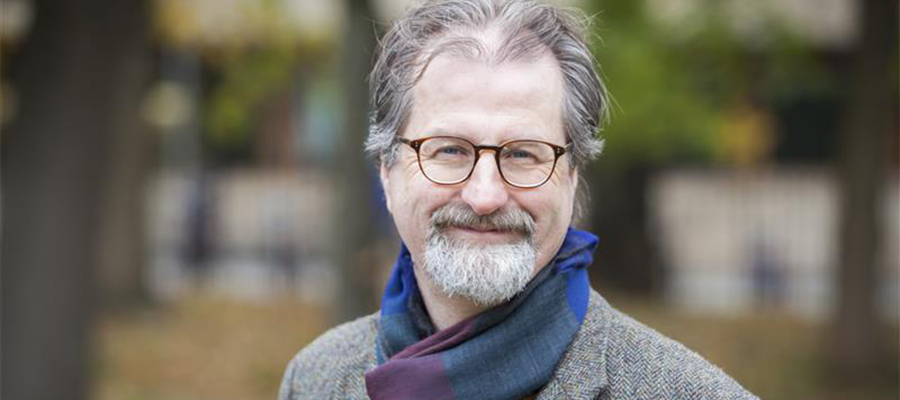How donor support is driving climate action across our community

From environmental stewardship to community care and climate education, donor generosity is helping to accelerate the University’s response to the climate crisis in diverse and meaningful ways. Whether through legacy giving, hands-on fundraising, or scholarships that empower the next generation of climate leaders, supporters across our community are fuelling projects and programmes that make a real difference.
A legacy for a sustainable future

Richard Casebow, a psychotherapist and Alexander technique teacher, has built a career rooted in philosophy, compassion, and a deep commitment to sustainability. Although he has no formal ties to the University of Edinburgh, his decision to leave a legacy gift reflects his belief in education and environmental stewardship as vital to the future.
After studying philosophy at the University of Aberdeen, Richard briefly pursued accountancy before realising it wasn’t for him. A period of reflection led him to the Alexander technique, which he found complemented psychotherapy and shaped the following three decades of his work. “I found a way to be a philosopher,” Richard explained, “but in the way that I can help people live richer lives by integrating physical and emotional well-being within philosophical inquiry.”
Richard chose to support the University of Edinburgh because of its reputation for making a meaningful impact, particularly in sustainability. “I felt the biggest impact I could have was to put money towards sustainability and the environment,” he explained. “If we fail to achieve a sustainable environmental future, those who come after us may have no future at all.”
Inspired partly by the Centre for Human Ecology, which began in Edinburgh, Richard hopes his legacy of supporting rewilding and sustainability projects will help drive meaningful change. “Through these initiatives is where my legacy can have the most impact,” he said.
Legacy giving
If you would like to discuss leaving a legacy in your Will to support the University’s work, please visit our website or contact our Head of Legacies and Planned Gifts: Morag.Murison@ed.ac.uk
From surplus PPE to community impact

Emma Boyd’s decision to support All4Paws grew from her admiration for the student-run, veterinarian-supervised clinic that offers free care to the pets of people who are homeless or vulnerably housed. “Many larger animal charities overlook All4Paws,” Emma explained, “and I wanted to help the team continue to provide their vital service to our local community.” She also values the experience it gives students, noting that volunteers “give up their valuable free time” and that the clinic provides “excellent hands-on training… which will be of huge benefit to them when they qualify as vets.” For Emma, All4Paws “deserve every penny raised.”
Her fundraising idea emerged from a practical challenge at the Royal (Dick) School of Veterinary Studies, where surplus PPE had built up as safety requirements changed. “I had the opportunity to go through our older PPE to salvage useful equipment that was no longer needed at Easter Bush,” she said. Working with colleagues Heather and Sharon, she spent several days clearing the campus and gathering more than 100 bags of usable items. “We were thrilled with our haul.”
The team sorted everything, donating lab coats, riding helmets, and boots to local charities and community groups. The remaining items formed a two-day pop-up shop where students could pay whatever they felt the equipment was worth. “This was great, as it meant that all our students could afford to buy whatever they needed.” The response was far beyond expectations: “The pop-up shop was a roaring success, and the amount raised was utterly unbelievable.”
The experience has inspired Emma to continue the initiative. “I would love to make this an annual fundraising event for the school,” she said. And her advice for others is simple: “Everyone loves a bargain, whatever you are thinking of selling, now is the time to do so!”
Fundraise Your Way
If you are interested in raising money in aid of the University of Edinburgh cause you care about most, please visit the website:
Supporting future climate leaders

Catherine Barber (r) – scholarship supporter; and Lucia Sadier (l) current masters student and scholarship recipient
The MSc Climate Change Management Scholarship reflects a shared commitment to supporting future climate leaders while honouring the legacy of Dr John Douglass Barber. Established by alumna Catherine Barber, the award offers £5000 to a prospective student beginning the Climate Change Management MSc in 2025/26. The scholarship is applied directly to tuition fees, with any remaining funds supporting living costs, and recipients are encouraged to take an active role in the postgraduate community by engaging in presentations, training, and development opportunities throughout the year.
For Catherine, who completed her MSc in Carbon Management in 2018, the decision to create the scholarship was rooted in her own experience of the programme and in her father’s belief in education as a force for progress. “I had a wonderful time studying for my MSc in Edinburgh,” she said. “Ten years ago, when I started, the programme was a pioneer, and it’s fantastic to see how graduates have spread in all directions. My online classmates came from every continent and we now enjoy being part of a global network of climate professionals.” She added, “I’m glad to support the ongoing success of this course and have offered this scholarship in memory of my father John Barber, an academic historian who believed in political and social change and was always optimistic about the future.”
This spirit of optimism and purpose is already being carried forward by current scholarship recipient Lucia Sadier. “The MSc Climate Change Management scholarship has made an enormous difference to my studies,” Lucia explained. “This scholarship has allowed me to fully immerse myself in the course and take advantage of everything the university has to offer.”
Drawn to the programme to deepen her understanding of sustainability, she hopes to use her training to support organisations in shaping their climate commitments. “After graduating, I hope to work in a role advising either private or public sector organisations on their net zero strategy,” she said. “I believe that there is still significant progress to be made in this sector, and I believe that the knowledge and experience gained on this course will allow me to play a meaningful role in driving change.”
Sustainability in teaching and learning
How alumni funding energised a hands-on student climate project

A Student Experience Grant funded by alumni enabled nine MSc Carbon Management students based in Kenya to take part in a project that brought their learning to life. One aspect of this was visitng InsectiPro, an innovative insect farm, sustainably producing valuable insect products for future-proof food and value chains for mass production.
For Marvel Owina, seeing climate solutions in practice transformed the way she understood key concepts. “Visiting InsectiPro gave us a chance to see how climate solutions are being applied locally,” she explained. What struck her most was witnessing carbon finance in action: “What stood out was how the company is also tapping into carbon markets for extra income, something many of us had only read about in theory.”
The group then spent time at the wildlife sanctuary around Lake Elementaita, where nature itself became part of the classroom. “We learned about conservation work and nature-based solutions,” Marvel said. Being immersed in the landscape helped connect theory with lived experience, allowing the students to see “how ecosystems sequester carbon, how communities handle natural resources, and why conserving nature is also a climate solution.”
A highlight of the project was the chance to meet in person – something that rarely happens for remote learners. “This was one of the few opportunities we had to meet,” Marvel shared. The experience strengthened their sense of belonging and even inspired students to begin building a Climate Action Network to support future collaboration.
Even when plans changed at the last minute, the outcome remained overwhelmingly positive. A sudden public holiday meant rearranging the schedule, but InsectiPro stepped in immediately. “Fortunately, they were incredibly supportive and agreed to host us on short notice,” she said.
For Marvel, the project was a powerful reminder of why she chose this field. It offered real-world insight, strengthened community, and showed how donor-funded opportunities can help students witness climate action where it’s already happening – on the ground.
Student Experience Grants
Student Experience Grants are one-off contributions of up to £5,000 to support projects and initiatives that will enhance students’ social, academic, entrepreneurial, sporting or cultural development. The alumni-funded grants have supported projects at the University for many years.
Related links
Giving to the University of Edinburgh

